9 stories of people helping others during the Omicron wave in Hong Kong
The spike of Omicron in Hong Kong created a worrying mix of concerns and uncertainties. But behind the numbers of infections and deaths, frontline workers – doctors, nurses, counsellors, social workers, caregivers, engineers, volunteers and others – have been working around the clock to curb the outbreak and support people who are most vulnerable. Here are the stories of frontline workers witnessing the distress and resiliency of the Hong Kong community during their work.
Ms Lucy Lau, MSF project coordinator
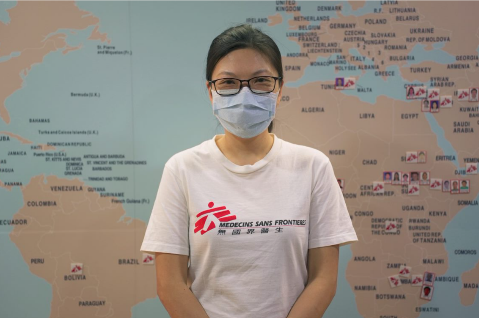
What moved me most was the heavy workload of the frontline workers and the tremendous pressure they were under. When I talked to those working in elderly homes, I've heard of older people, who would usually be hospitalised right away, having to wait for more than two days without being admitted. I could only imagine the frontline workers' helplessness during the wait. The alarming situation in the care homes is a key factor why MSF team has connected with some elderly homes help them build preparedness to face any possible outbreaks in the future. They all did their best with the resources they had though, and they truly deserve to be acknowledged.
- Ms Lucy Lau, MSF project coordinator
Dr Nason Tan, Regional Director of Operations Support Unit of MSF Hong Kong
A physician with a public health background, Dr Nason Tan is also the medical referent for MSF COVID-19 response programme in Hong Kong. He visited some nursing care homes for the elderly as part of his work with MSF.
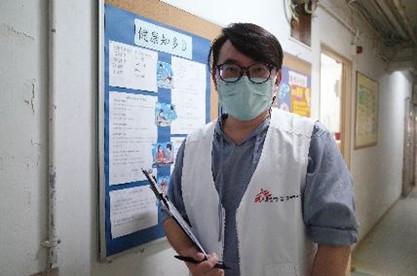
There are a couple of inspiring moments in my work, but the most memorable one would be from my experiences at elderly care homes to identify the gaps and offer support to improve the situation of residents and caregivers alike. Our team encountered staff being overwhelmed with desperation, hopelessness and helplessness in managing elderly residents during the peak of the outbreak. This stressful condition was compounded by delayed emergency calls pick-up, ambulance availability and the wildfire-like quick spread of infection. They sure have gone through a lot and should be applauded, the same way as we recognise the hard work and contribution of frontline medical workers
-Nason Tan, Regional Director of Operations Support Unit of MSF Hong Kong
Dr Joyce Ching, MSF medical doctor
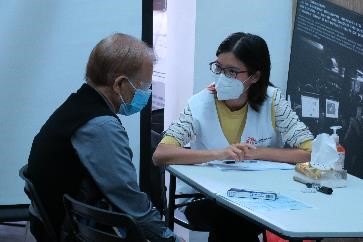
Most of the elderly are struggling making their decision about getting inoculated. Considering their existing chronic illnesses, it’s no wonder they would worry about the side effects of vaccine. They rarely have a chance to share their concerns with others, become even more lonely and have lost their connection with society, especially the elderly living alone, during the 5th wave. Continued isolation might cause mental health issues and must be addressed. Keeping in touch with these group and supporting them to rebuild their communication and social relationship is very important to encourage them to go back to a certain level of normalcy.
-Dr Joyce Ching, MSF medical doctor
Dr Joyce Ng (Left) & Dr Jacqueline So (Right), volunteer doctors with MSF Hong Kong
Joyce and Jacqueline are frontline medical doctors working in a public hospital. They had been serving in isolation wards and have provided free health consultations to people experiencing homelessness during MSF’s vaccination drive in Sham Shui Po.

Many people experiencing homelessness are not vaccinated because they lack access to health and medical information, they don’t have smartphones or they don’t have internet to book their appointments. Government hotlines and designated clinics were all jammed during the surge of infections. Even though we have a good public healthcare service, there are still vulnerable groups that are facing neglect. I’m glad that the social workers identified them and encouraged them to attend our vaccination programme, otherwise, they’d become the forgotten ones in the society.
-Joyce, MSF medical doctor
I think what so many vulnerable individuals ask for is so trivial yet significant. A homeless person once told me that his immediate need is a pair of slippers, so he doesn't have to go to the public bathroom barefoot. It is challenging for the homeless to maintain good self-hygiene as they may not have clean clothes, towels, or shower soap. A small thing might change their health condition and even make them feel better. It reminds me that we need to be thoughtful when attending to the needy. And it is important to be mindful of the necessities of the vulnerable groups to combat the virus
-Jacqueline, MSF medical doctor
Dr Y. H. Tam, medical doctor and Public Health Medicine Specialist of Shoebill Health Care
MSF runs a vaccination programme for vulnerable groups and collaborates with Shoebill Health Care where Dr Y.H. Tam is a general practitioner. He shares the toll of Omicron and the impact of overwhelming information on vulnerable groups and responders alike.
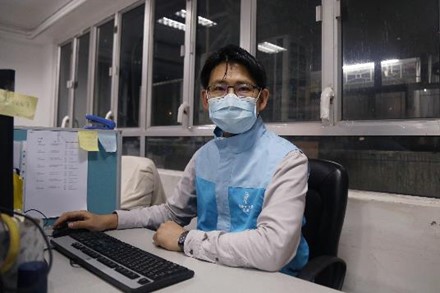
Being on the frontline, sometimes I felt upset and stressed. I saw some extreme cases in care homes. Those who could move around on wheelchairs and eat with spoons by themselves were not yet fully vaccinated had succumbed to the infection and required hospital care. They became bedbound, needed tube feeding and bore multiple bedsores when being discharged back to their respective care homes. In contrast, some failed to recover and could never come back.
The ever-changing issues and confusing information were accentuated during the 5th wave when information was updated almost every day and was often complicated. Even practising health care providers find it difficult to keep themselves up to date with the latest policies and measures. On top of that, the recent breakdown of the community support network made reaching the vulnerable groups even more difficult.
-Dr Y. H. Tam, medical doctor and Public Health Medicine Specialist of Shoebill Health Care
Mr Marco Wong, project volunteer
Marco is an MSF Hong Kong office staff member who has been actively volunteering to support the MSF COVID-19 response in Hong Kong. He joined several vaccination activities for the people experiencing homelessness, the elderly, and low-income families.
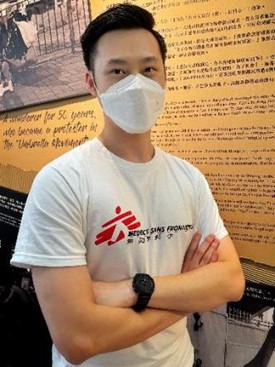
As a volunteer, my main duties are distribution of supplies and health promotion. I talked to a few people who were homeless. Many of them have difficulty getting information, like how to use the Rapid Antigen Tests kit and what to do next if they have tested positive. Also, it is quite challenging for them to get on the internet and book their vaccination or book a designated clinic. That’s why our approach is not just to provide jabs but also assist them with their basic health information needs.
-Mr Marco Wong, project volunteer
Lin Wai Kiu, Ivan, Community Organiser of SoCO
Ivan is a social worker in the Society for Community Organization (SoCO) who has focused on caring for the elderly living in Sham Shui Po for several years.
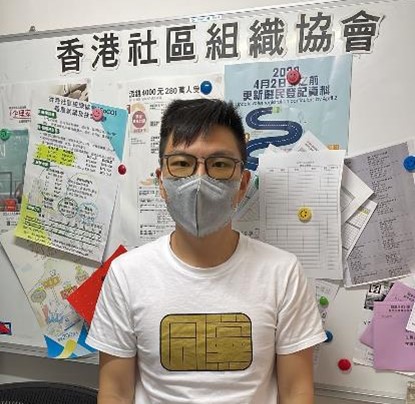
Many elderly people living in my work district got infected, and the number kept increasing every day exponentially in February. We received many urgent requests during that period, but we lacked staff as some of our colleagues got infected. Some older people tried to call the public healthcare service hotlines, but call receivers only advised them to seek help from family or friends. Many of them are living alone actually and they have no one to call for help. They told me, “Ivan, you are my only “family member”; I can only seek help from you.It was not easy for me, but this is my mission and I am so proud to be one of the frontline workers and contribute to supporting vulnerable groups.
-Lin Wai Kiu, Ivan, Community Organiser of SoCO
Ng Wai Tung, community organiser of SoCO
Ng Wai Tung is an experienced community organiser for SoCO and have witnessed the increased homelessness during the pandemic.
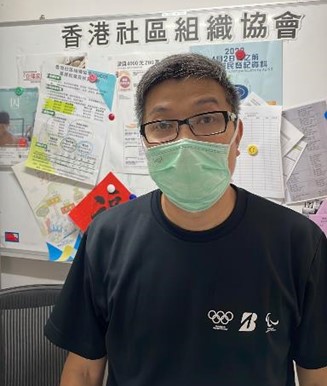
Some of the people experiencing homelessness used to live in mainland China but cannot go back home now due to the travel restrictions. Some were drivers who transfer goods across the border or chefs, and they lost their job in the 5th wave. The need is increasing. Most of them, especially the newcomers, have stopped caring of themselves, and they do not have a connection with society. It is pretty challenging for them to follow all the latest disease prevention measures and arrangements from the government. All we need is to be patient and encouraging. For example, we collaborated with MSF to provide vaccination programme to the vulnerable groups in March and April. Before it started, I went where they usually showed up and reminded them to go one by one. It is hard to manage the outcomes when we are helping homeless people. Yet I appreciate very much that we got lots of support from different working partners like MSF and other organisations. Together, we can make changes to the vulnerable groups.
-Ng Wai Tung, community organiser of SoCO





Leave a Comment